Walls
Ghazi and I landed in Buffalo at 1:15 a.m. last Friday, after 23 hours in transit, and – bonheur inespéré – were met at the baggage claim by Cort, who carried us gently home. The stupor began to lift by Tuesday, enough that by noon I ventured up to UB's Clark Pool. Swimmers accustomed to the Olympic-standard facilities on the North Campus are frustrated at Clark: besides being tiny and crowded, it lacks the modern design features which minimize turbulence. So swimming there is like swimming in open water on a blustery day, plus chlorine, minus fresh air and elbow room. My prolonged exile had so altered my body composition that I had far less muscular ballast than before I left, and this added buoyancy gave my effort an uncanny resemblance to swimming in the Dead Sea. I had declined the chance to make that very excursion only days earlier, amply satisfied to have floated once long ago in that hot salt. But each time I hit the wall to turn, I remembered what it felt like to be unable to sink.
Doing laps on Tuesday, I thought about the precarious infrastructure of my daily routine, especially those of its elements in which I most exult. Restricted to Clark Hall, I might nevertheless be a daily swimmer, but there is a point of exasperation beyond which my commitment does not extend. Local frustrations are trivial compared to the obstacles impeding exercise in the Middle East: the scarcity and expense of facilities for sports like swimming or weight training, the irregularity of crowded road and sidewalk surfaces for cyclists or runners, the lung-searing toxicity of the atmosphere in Cairo and Damascus, and perhaps most of all for women, the absence of any cultural context in which physical exercise, and the forward-looking ameliorist program it implies, could be comprehended.
With whatever zeal a program of self-help strategies might be proposed, such an array of obstacles saps its momentum. Indeed for the Palestinian, the problem is not that he cannot sink, but that he cannot rise to the surface. Edward Saïd writes of Ghassan Kanafani's novel Men in the Sun that suffocation is the preferred metaphor for existence for the Palestinian. Still, an irresistible impulse compels members of our culture to prod people to assume responsibility for the alleviation of their own suffering. Wherever we look in Palestine, someone is afflicted with a disease caused by avoidable behaviors. The rampant prevalence of diabetes, heart disease, emphysema, and lung cancer could not fail to yield to a public health campaign which the American visitor is impatient to see launched. Beyond these illnesses there loom other targets for activism: the ubiquity of hepatitis, the frequency of birth defects in an endogamous society, and the needlessly high incidence of head trauma, amputation, and paralysis resulting from a complete absence of worker and consumer product safety protections.
By its very imperviousness to challenge, our desire to alleviate human suffering ought, as a motive, to invite at least a curious regard. Humans are rarely driven by unalloyed altruism, but even if this were not so, we are confronted here with the vigorous resistance of the intended beneficiaries to the very blessings we would help them reap. What is the meaning of this perverse affront, and what does it reveal?
I think that the resistance of the Palestinian people to messages promoting self-help reveals two things – not about "them" or their culture but rather about the encounter between our two cultures The first is that when we focus exclusively on the population's avoidable self-destructive behaviors, or on constructive behaviors which we endorse and they elect not to adopt, we appear to Palestinians to be willfully averting our gaze from what is by far the most significant factor for their health and well-being, and that is the fact of life under Israeli occupation. Some urge their friends to quit smoking or to switch to diet ("light") Coke, but what arrogance to promote these palliatives and to be silent about the 67 Palestinian women who, since 1980, have given birth waiting to get through Israeli checkpoints in the West Bank, and 39 of whose infants died ("Palestinian Health Care Conditions Under Occupation," Sonia Nettnin). Our official silence over Israel's "Security Fence" / "Apartheid Wall" signals to Palestinians that its catastrophic effects on their health care system are not a subject we wish to contemplate. And why do we avert our gaze? Because we know that without our complicity, there could be no wall and no occupation, and that we are ultimately implicated in the continuing repression of the Palestinians' basic human rights. What standing can we have to urge the Palestinians to assume responsibility for their lives if we deal with our own guilt by shifting responsibility over to our victims?
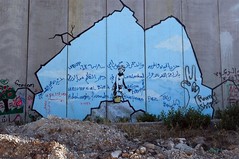
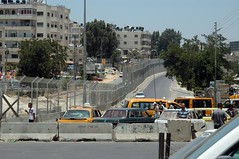
There is another reason why our well-intentioned admonitions do not resonate with our Palestinian friends, and this has to do with a commitment to and belief in "progress" which is deeply, deeply engrained in us. Perhaps more than other Westerners, and certainly far more than Arabs, Americans believe that things can be better, that we can improve our lives through our own efforts, and that given such a possibility, it is a moral imperative to work to bring about that improvement; indeed this was the ideology of the entire Clinton presidency. An American regards himself and each of his children as infinitely perfectible individuals. "How to" and self-help books, summer reading lists, tennis coaching, classes in meditation and parenting, body sculpting, nutritional supplements and cosmetic surgery are all evidence of our belief that we can be better tomorrow than we are today.
Our miscommunication with Palestinians might simply be explained by the observation that there is in their society no such notion of people who are continuously self-made and self-updating. But there is a more serious problem between us. The self-improvement enterprise begins with self-criticism as well as criticism of others, since we criticize ourselves via comparison, and in some cases must find that it is others who are wanting. It carries an expectation that others will improve themselves just as we are improving ourselves, or better yet, that they will yield to our ideas for overcoming their deficiencies. However benevolent its overt intention, the exhortation to self-improvement begins with the same critical glance and the same contestation of superiority as the colonial enterprise. Reform plans we make for others, to judge by my own, have invariably two characteristics: they cost us nothing, and they redound to our benefit. As much by our selective silence as by our hortatory eloquence, we reveal that it is we who are the ultimate beneficiaries of the initiatives we support. The engagement in a life-long program of self-improvement, self-invention and self-renewal is inseparable from the impulses which are at the heart of the colonial project: observe, compare, criticize, exhort, exploit, and rationalize.
Is our meddling in the affairs of others a matter of excess capacity, a random by-product of the individual striving cultivated in us by centuries of religious and cultural tradition, or is individual self-improvement merely the presentable alibi we show to cover a project of perpetual exploitation of the other?
* * *
Many long years after Christmas had lost its power to move me, I could recapture some of its sentimental energy by going alone into the living room at night to sit by myself with the tree. In the stillness, the tree's forest refugee fragrance and its colorful lights eventually subdued my awareness of advertising jingles, rehearsals for various pageants, and family disputes. In its humble company, I could return if not to belief in parthenogenesis and redemption, at least to faith in the generosity of the human spirit and other virtues seasonally celebrated in such chestnuts as "Miracle on 34th Street" or "It's a Wonderful Life." It is rare that I can recapture that moment now, despite a willing—a so much more than willing—suspension of disbelief, and some of Lynchburg's export quality whisky.
For many people, the city of Jerusalem exercises a kind of religious power. That its aura is also political is inevitable, since the separation of "church" and state is as alien to Islam and Judaism as it was to the European Crusaders against whose incursions the old city's walls were constructed. Achieving a religious experience of the Holy Land requires suppression of far more than commercial advertising and family arguments. I attempted to transcend these earthly distractions by proxy, going first with the Christian experience, which seemed most likely to be accessible to me. I am not moved by the re-enactors who travel along the Via Dolorosa from one Station of the Cross to the other, or at least not moved to anything resembling prayerfulness.
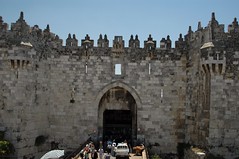
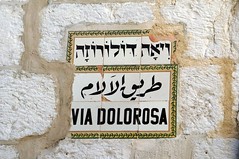
But the Church of the Holy Sepulcher is sacred to me for an entirely private reason: that it was such a joy, such an uphoped for blessing, and such an overwhelming religious experience for my uncle Allan to bring his parishioners from Nashville to pray in the place where tradition says that Jesus was buried.

The Western Wall, all that remains of the Second Temple constructed by Herod the Great, is sacred to Jews and respected by Christians and Muslims as well. According to Rabbi Shraga Simmons, ("The Western Wall," published by the Israeli Ministry of Defense), the Wall is holy because it was the site of the holy temple, remains a permanent reminder of God's presence, is a place of pilgrimage and tears, has remained a focus of prayers, was built with love and dedication, and was the site of Jewish heroism. The Jerusalem Post reports that on Sunday June 25th, some 5,000 worshippers gathered at the Western Wall to pray for the release of the 19-year-old kidnapped soldier Gilad Shalit, a tank gunner captured near Gaza. Worship at this holiest of Jewish sites traditionally entails placing into a crevice of the wall itself a small piece of paper on which a prayer or request is written. (Not surprisingly, online services facilitating remote prayer have sprung up.)
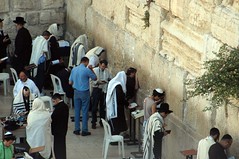
The third holiest site in Islam is located in the same complex as the Western Wall, a complex known to Jews and Christians as the Temple Mount, and to Muslims as el Haram e-Sharif or noble sanctuary. From a rock in the center of the the Haram e-Sharif the Prophet Muhammed is believed to have ascended to heaven. The Dome of the Rock was constructed over this rock, but this places it also over the site of the Second Jewish Temple. Thus, as the Wikipedia article explains, there is one extremist Israeli faction which wishes to transport the Dome of the Rock to Mecca so that the Third Temple can be constructed on the Temple Mount. Because the ground itself under the Dome is considered sacred, no Muslims support this plan, and few Israelis do either. But fundamentalist Christian groups view the construction of the Third Temple as an enterprise to be launched as soon as possible so as to hasten the Second Coming, Armageddon, and the Rapture.
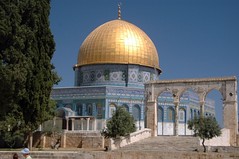
Each of these sites -- the sepulcher, the wall, the sanctuary -- has an aura of sanctity which comes, if not from a divine presence, at least from the intensity of the assembled believers. In prayer, Christians kneel down to kiss the sepulchral rock, Jews bend forward to touch the wall with their heads, and Muslims prostrate themselves in submission to God. It could be possible to achieve a state of prayerfulness here, almost to live in a state of prayerfulness, were it not for the unbending righteousness of the zealots and the ungodly hatreds they unleash upon each other. Is it praying if I ask the Lord that he should smite mine enemies with his sword? What kind of prayer for peace would cancel out all the prayers for annihilation making their up to the sky? Maybe we should pray for the humility to know how to pray at all.
In each of the great religious traditions, prayer requires a personal engagement. There is no mailing off the request to God and then sitting back. Coasting along the path of least resistance for so long, I have rationalized my disengagement with the excuse that the Israeli-Palestinian dispute is not for amateurs, that it requires either full-time commitment or none at all; that it isn't my business really; that I have no dog in that race. But this week, as Reham is preparing to leave Jerusalem for Cairo, Israel has raided Palestinian government headquarters in nearby Ramallah, seizing eight members of the cabinet and twenty members of the legislature, and has destroyed much of Gaza, through which Reham's bus to Egypt might normally have passed. How very like a dereliction of parental duty it now feels never to have done any small thing to contribute to peace, to a better existence for Palestinians. And how precious beyond everything the dog I don't have in that race.
The incursion which captured Shalit and the massive Israeli retaliation come just as the Palestinian government has approved a National Reconciliation Plan drafted by five political prisoners held in Israeli prisons. In polls, 77% of the Palestinian people support the document, which calls for the creation of a Palestinian state within the 1967 borders, as well as a right of return for Palestinians displaced since 1948. The latter provision, even on the hypothesis that it actually resulted in anyone actually reclaiming territory in Israel, can scarcely be taken as a serious threat to "eliminate Israel as a Jewish state by flooding it with Palestinians" ("Israelis Batter Gaza and Seize Hamas Officials," New York Times, June 26, 2006). Nevertheless, the prospect of hearings over expropriated land is threatening to Israelis because the moral foundation of the society depends on the truth of a founding myth which cannot sustain scrutiny: a land without people for a people without land. (Read the transcript of an interview on this subject on Amy Goodman's Democracy Now! June 29th program.) The prospect of a political settlement is also unsettling to various external Arab regimes, indeed the Syrian government is thought to be behind the incursion, and to have banked on the extremism of the Israeli reaction.
The current rampage is already fading from the our headlines, and yet in its aftermath the most choking misery will fall more thickly than ever on the Palestinian people. Except in the United States and Israel, everyone understands that there is no military solution. There is also no diplomatic solution, no religious solution, no political solution, no economic or social solution which can succeed in the current mental landscape and its physical avatars on the ground. There is only the slender hope that a fresh and brilliant imagination will emerge through whose vision people will be transported to that open field beyond ideas of right-doing and wrong-doing, past the smog of prayers of mutually assured destruction, beyond the utopias they yearn for, to a space where they can breathe.
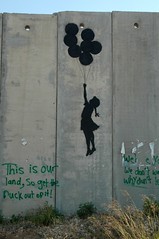
Doing laps on Tuesday, I thought about the precarious infrastructure of my daily routine, especially those of its elements in which I most exult. Restricted to Clark Hall, I might nevertheless be a daily swimmer, but there is a point of exasperation beyond which my commitment does not extend. Local frustrations are trivial compared to the obstacles impeding exercise in the Middle East: the scarcity and expense of facilities for sports like swimming or weight training, the irregularity of crowded road and sidewalk surfaces for cyclists or runners, the lung-searing toxicity of the atmosphere in Cairo and Damascus, and perhaps most of all for women, the absence of any cultural context in which physical exercise, and the forward-looking ameliorist program it implies, could be comprehended.
With whatever zeal a program of self-help strategies might be proposed, such an array of obstacles saps its momentum. Indeed for the Palestinian, the problem is not that he cannot sink, but that he cannot rise to the surface. Edward Saïd writes of Ghassan Kanafani's novel Men in the Sun that suffocation is the preferred metaphor for existence for the Palestinian. Still, an irresistible impulse compels members of our culture to prod people to assume responsibility for the alleviation of their own suffering. Wherever we look in Palestine, someone is afflicted with a disease caused by avoidable behaviors. The rampant prevalence of diabetes, heart disease, emphysema, and lung cancer could not fail to yield to a public health campaign which the American visitor is impatient to see launched. Beyond these illnesses there loom other targets for activism: the ubiquity of hepatitis, the frequency of birth defects in an endogamous society, and the needlessly high incidence of head trauma, amputation, and paralysis resulting from a complete absence of worker and consumer product safety protections.
By its very imperviousness to challenge, our desire to alleviate human suffering ought, as a motive, to invite at least a curious regard. Humans are rarely driven by unalloyed altruism, but even if this were not so, we are confronted here with the vigorous resistance of the intended beneficiaries to the very blessings we would help them reap. What is the meaning of this perverse affront, and what does it reveal?
I think that the resistance of the Palestinian people to messages promoting self-help reveals two things – not about "them" or their culture but rather about the encounter between our two cultures The first is that when we focus exclusively on the population's avoidable self-destructive behaviors, or on constructive behaviors which we endorse and they elect not to adopt, we appear to Palestinians to be willfully averting our gaze from what is by far the most significant factor for their health and well-being, and that is the fact of life under Israeli occupation. Some urge their friends to quit smoking or to switch to diet ("light") Coke, but what arrogance to promote these palliatives and to be silent about the 67 Palestinian women who, since 1980, have given birth waiting to get through Israeli checkpoints in the West Bank, and 39 of whose infants died ("Palestinian Health Care Conditions Under Occupation," Sonia Nettnin). Our official silence over Israel's "Security Fence" / "Apartheid Wall" signals to Palestinians that its catastrophic effects on their health care system are not a subject we wish to contemplate. And why do we avert our gaze? Because we know that without our complicity, there could be no wall and no occupation, and that we are ultimately implicated in the continuing repression of the Palestinians' basic human rights. What standing can we have to urge the Palestinians to assume responsibility for their lives if we deal with our own guilt by shifting responsibility over to our victims?


There is another reason why our well-intentioned admonitions do not resonate with our Palestinian friends, and this has to do with a commitment to and belief in "progress" which is deeply, deeply engrained in us. Perhaps more than other Westerners, and certainly far more than Arabs, Americans believe that things can be better, that we can improve our lives through our own efforts, and that given such a possibility, it is a moral imperative to work to bring about that improvement; indeed this was the ideology of the entire Clinton presidency. An American regards himself and each of his children as infinitely perfectible individuals. "How to" and self-help books, summer reading lists, tennis coaching, classes in meditation and parenting, body sculpting, nutritional supplements and cosmetic surgery are all evidence of our belief that we can be better tomorrow than we are today.
Our miscommunication with Palestinians might simply be explained by the observation that there is in their society no such notion of people who are continuously self-made and self-updating. But there is a more serious problem between us. The self-improvement enterprise begins with self-criticism as well as criticism of others, since we criticize ourselves via comparison, and in some cases must find that it is others who are wanting. It carries an expectation that others will improve themselves just as we are improving ourselves, or better yet, that they will yield to our ideas for overcoming their deficiencies. However benevolent its overt intention, the exhortation to self-improvement begins with the same critical glance and the same contestation of superiority as the colonial enterprise. Reform plans we make for others, to judge by my own, have invariably two characteristics: they cost us nothing, and they redound to our benefit. As much by our selective silence as by our hortatory eloquence, we reveal that it is we who are the ultimate beneficiaries of the initiatives we support. The engagement in a life-long program of self-improvement, self-invention and self-renewal is inseparable from the impulses which are at the heart of the colonial project: observe, compare, criticize, exhort, exploit, and rationalize.
Is our meddling in the affairs of others a matter of excess capacity, a random by-product of the individual striving cultivated in us by centuries of religious and cultural tradition, or is individual self-improvement merely the presentable alibi we show to cover a project of perpetual exploitation of the other?
* * *
Many long years after Christmas had lost its power to move me, I could recapture some of its sentimental energy by going alone into the living room at night to sit by myself with the tree. In the stillness, the tree's forest refugee fragrance and its colorful lights eventually subdued my awareness of advertising jingles, rehearsals for various pageants, and family disputes. In its humble company, I could return if not to belief in parthenogenesis and redemption, at least to faith in the generosity of the human spirit and other virtues seasonally celebrated in such chestnuts as "Miracle on 34th Street" or "It's a Wonderful Life." It is rare that I can recapture that moment now, despite a willing—a so much more than willing—suspension of disbelief, and some of Lynchburg's export quality whisky.
For many people, the city of Jerusalem exercises a kind of religious power. That its aura is also political is inevitable, since the separation of "church" and state is as alien to Islam and Judaism as it was to the European Crusaders against whose incursions the old city's walls were constructed. Achieving a religious experience of the Holy Land requires suppression of far more than commercial advertising and family arguments. I attempted to transcend these earthly distractions by proxy, going first with the Christian experience, which seemed most likely to be accessible to me. I am not moved by the re-enactors who travel along the Via Dolorosa from one Station of the Cross to the other, or at least not moved to anything resembling prayerfulness.


But the Church of the Holy Sepulcher is sacred to me for an entirely private reason: that it was such a joy, such an uphoped for blessing, and such an overwhelming religious experience for my uncle Allan to bring his parishioners from Nashville to pray in the place where tradition says that Jesus was buried.

The Western Wall, all that remains of the Second Temple constructed by Herod the Great, is sacred to Jews and respected by Christians and Muslims as well. According to Rabbi Shraga Simmons, ("The Western Wall," published by the Israeli Ministry of Defense), the Wall is holy because it was the site of the holy temple, remains a permanent reminder of God's presence, is a place of pilgrimage and tears, has remained a focus of prayers, was built with love and dedication, and was the site of Jewish heroism. The Jerusalem Post reports that on Sunday June 25th, some 5,000 worshippers gathered at the Western Wall to pray for the release of the 19-year-old kidnapped soldier Gilad Shalit, a tank gunner captured near Gaza. Worship at this holiest of Jewish sites traditionally entails placing into a crevice of the wall itself a small piece of paper on which a prayer or request is written. (Not surprisingly, online services facilitating remote prayer have sprung up.)

The third holiest site in Islam is located in the same complex as the Western Wall, a complex known to Jews and Christians as the Temple Mount, and to Muslims as el Haram e-Sharif or noble sanctuary. From a rock in the center of the the Haram e-Sharif the Prophet Muhammed is believed to have ascended to heaven. The Dome of the Rock was constructed over this rock, but this places it also over the site of the Second Jewish Temple. Thus, as the Wikipedia article explains, there is one extremist Israeli faction which wishes to transport the Dome of the Rock to Mecca so that the Third Temple can be constructed on the Temple Mount. Because the ground itself under the Dome is considered sacred, no Muslims support this plan, and few Israelis do either. But fundamentalist Christian groups view the construction of the Third Temple as an enterprise to be launched as soon as possible so as to hasten the Second Coming, Armageddon, and the Rapture.

Each of these sites -- the sepulcher, the wall, the sanctuary -- has an aura of sanctity which comes, if not from a divine presence, at least from the intensity of the assembled believers. In prayer, Christians kneel down to kiss the sepulchral rock, Jews bend forward to touch the wall with their heads, and Muslims prostrate themselves in submission to God. It could be possible to achieve a state of prayerfulness here, almost to live in a state of prayerfulness, were it not for the unbending righteousness of the zealots and the ungodly hatreds they unleash upon each other. Is it praying if I ask the Lord that he should smite mine enemies with his sword? What kind of prayer for peace would cancel out all the prayers for annihilation making their up to the sky? Maybe we should pray for the humility to know how to pray at all.
And he spake this parable unto certain which trusted in themselves that they were righteous, and despised others: Two men went up into the temple to pray; the one a Pharisee, and the other a publican. The Pharisee stood and prayed thus with himself, God, I thank thee, that I am not as other men are, extortioners, unjust, adulterers, or even as this publican. I fast twice in the week, I give tithes of all that I possess. And the publican, standing afar off, would not lift up so much as his eyes unto heaven, but smote upon his breast, saying, God be merciful to me a sinner. I tell you, this man went down to his house justified rather than the other: for every one that exalteth himself shall be abased; and he that humbleth himself shall be exalted. Luke 18:9-14.
In each of the great religious traditions, prayer requires a personal engagement. There is no mailing off the request to God and then sitting back. Coasting along the path of least resistance for so long, I have rationalized my disengagement with the excuse that the Israeli-Palestinian dispute is not for amateurs, that it requires either full-time commitment or none at all; that it isn't my business really; that I have no dog in that race. But this week, as Reham is preparing to leave Jerusalem for Cairo, Israel has raided Palestinian government headquarters in nearby Ramallah, seizing eight members of the cabinet and twenty members of the legislature, and has destroyed much of Gaza, through which Reham's bus to Egypt might normally have passed. How very like a dereliction of parental duty it now feels never to have done any small thing to contribute to peace, to a better existence for Palestinians. And how precious beyond everything the dog I don't have in that race.
The incursion which captured Shalit and the massive Israeli retaliation come just as the Palestinian government has approved a National Reconciliation Plan drafted by five political prisoners held in Israeli prisons. In polls, 77% of the Palestinian people support the document, which calls for the creation of a Palestinian state within the 1967 borders, as well as a right of return for Palestinians displaced since 1948. The latter provision, even on the hypothesis that it actually resulted in anyone actually reclaiming territory in Israel, can scarcely be taken as a serious threat to "eliminate Israel as a Jewish state by flooding it with Palestinians" ("Israelis Batter Gaza and Seize Hamas Officials," New York Times, June 26, 2006). Nevertheless, the prospect of hearings over expropriated land is threatening to Israelis because the moral foundation of the society depends on the truth of a founding myth which cannot sustain scrutiny: a land without people for a people without land. (Read the transcript of an interview on this subject on Amy Goodman's Democracy Now! June 29th program.) The prospect of a political settlement is also unsettling to various external Arab regimes, indeed the Syrian government is thought to be behind the incursion, and to have banked on the extremism of the Israeli reaction.
The current rampage is already fading from the our headlines, and yet in its aftermath the most choking misery will fall more thickly than ever on the Palestinian people. Except in the United States and Israel, everyone understands that there is no military solution. There is also no diplomatic solution, no religious solution, no political solution, no economic or social solution which can succeed in the current mental landscape and its physical avatars on the ground. There is only the slender hope that a fresh and brilliant imagination will emerge through whose vision people will be transported to that open field beyond ideas of right-doing and wrong-doing, past the smog of prayers of mutually assured destruction, beyond the utopias they yearn for, to a space where they can breathe.


1 Comments:
Hi,
I am a musician who has been impacted by Keith Green and I would be honored if you would check out my music, all music is free to download. I just wanted to share my music with People who love Jesus. www.SeanDietrich.com
I don't want to be a pest, so if this really annoys you, please delete it and accept my humble apology.
Thanks so much,
-Sean
____________________
www.SeanDietrich.com
"All my music is free."
Post a Comment
<< Home